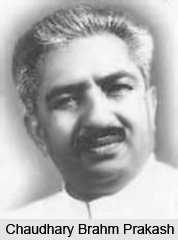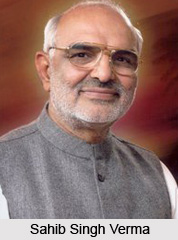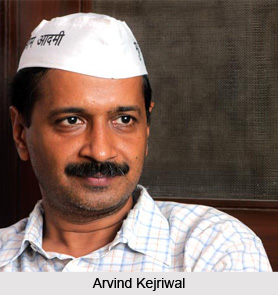 Chief Ministers of Delhi are significant politicians who serve as the chiefs of Government, who are also leaders of the majority political party in the Delhi assembly and heads of the Council of Ministers. They render their services as the executive branch of the Government of Delhi and represent the largest number of seats in the Legislative Assembly of Delhi. There are certain requisites for people who wish to be appointed as Chief Ministers which assert that they must be 25 years or older, must be members of the Legislative Assembly of Delhi and also must be an Indian citizen. These conditions have been laid down by the Article 84 of the Indian Constitution. Madan Lal Khurana, Chaudhary Brahm Prakash, Sushma Swaraj, Sheila Dikshit, Sahib Singh Verma and G.N. Singh have been some of the important Chief Ministers of Delhi.
Chief Ministers of Delhi are significant politicians who serve as the chiefs of Government, who are also leaders of the majority political party in the Delhi assembly and heads of the Council of Ministers. They render their services as the executive branch of the Government of Delhi and represent the largest number of seats in the Legislative Assembly of Delhi. There are certain requisites for people who wish to be appointed as Chief Ministers which assert that they must be 25 years or older, must be members of the Legislative Assembly of Delhi and also must be an Indian citizen. These conditions have been laid down by the Article 84 of the Indian Constitution. Madan Lal Khurana, Chaudhary Brahm Prakash, Sushma Swaraj, Sheila Dikshit, Sahib Singh Verma and G.N. Singh have been some of the important Chief Ministers of Delhi.
Chaudhary Brahm Prakash
Born in the year 1918, Chaudhary Brahm Prakash played an active role in the Satyagraha Movement founded by Mahatma Gandhi during 1940 and he was also associated with a few `underground activities` during the Quit India Movement launched during the British Raj in the country. His birthplace was the village of Jaffarpur Kalan in West Delhi and had been put behind the bars several times during the Indian freedom movement. He has also worked as the Minister in of Planning and Development (from the year 1952 till 1955) and a member of the community of Yadavas. He died in 1933.
Madan Lal Khurana
Madan Lal Khurana was born on 15th October, 1936 and he was the Chief Minister of Delhi from the year 1993 to 1996. Besides, he was also the Governor of Rajasthan and a member of Bharatiya Janata Party (BJP) and RSS. Following the demise of Indira Gandhi, the party of BJP was impacted adversely especially during the 1984 elections. His active participation in the party earned him the title of `Dilli ka Sher` or the Lion of Delhi. Along with Vijay Kumar Malhotra and Kedar Nath Sahani, Madan Lal Khurana was successful in helping the party survive from 1960 till the year 2000.
G.N. Singh
G.N.Singh had been appointed as the Chief Minister of Delhi form the period of 1955 to 1956, and he belonged to the Congress. He was the second Chief Minister of Delhi and the successor of Chaudhary Brahm Prakash and he served for an entire year and it was immediately after this incident that the Government of India passed a bill according to which Delhi was transformed into a Union Territory of the country.
Sahib Singh Verma
Sahib Singh Verma delivered his services as the Chief Minister of Delhi from 1996 to 1998 and also a member of the 13th Lok Sabha in the Parliament of India. He was born on 15th March, 1943 near Mundka Village, in outer portions of Delhi and he was the Vice-President of the Bharatiya Janata Party or BJP. His career also included service as the Union Labour Minister of India and had won votes representing the Janata Party and was elected again on a BJP ticket. During the year 1993, he had been announced as the Education and Development Minister in the Delhi government. He had been sworn in as the Chief Minister of Delhi after a corruption crisis was framed against Madan Lal Khurana. Madan Lal Khurana got involved in a political crisis regarding the rising onion prices due to which he was son replaced by Sushma Swaraj.
Sushma Swaraj
Sushma Swaraj is a Member of the Parliament for six years and she worked for three years as an MLA from the periods between 1977 and 1982 and 1987 and 1990 in Haryana, during 1998 in Delhi and is presently the Leader of Opposition in the 15th Lok Sabha. She was born on 14th February, 1952. She had previously rendered her services as the Chief Minister of Delhi and she was formerly a Union Cabinet Minister of India. Sushma Swaraj was India`s youngest Cabinet Minister when she was aged 25, in the year 1977. Later, she had to resign from the office of Union Cabinet in order to work as the Chief Minister of Delhi in October, 1998.
Sheila Dikshit
Born on 31st March, 1938 in the region of Kapurthala in Punjab, Sheila Dikshit was the Chief Minister of Delhi from the year 1998 till 2013 and she spearheaded the Indian National Congress. She is often considered to be one of the most powerful Indian politicians and she had represented the constituency of New Delhi in the Legislative Assembly of Delhi. She had been elected for three consecutive terms, from 1998 onwards and she had been the Chief Minister of Delhi for 15 years.
 Arvind Kejriwal
Arvind Kejriwal
Founder of the Aam Aadmi Party or AAP, Arvind Kejriwal is the 7th and present Chief Minister of Delhi, and he was born on 16th August, 1968. He founded the political party AAP (Aam Aadmi Party) in November, 2012, that portrays the `common man`. Arvind Kejriwal, representing the Aam Aadmi Party was sworn as the Chief Minister of Delhi on 28th December 2013. After his resignation from the position on February 2014, the national capital territory was under President"s rule. Arvind Kejriwal of the Aam Aadmi Party was again elected as the Chief Minister of Delhi on February 2015. He is the incumber Chief minister of the national capital territory.
Arvind Kejriwal has aimed to represent the aspirations and rights of the common masses during his tenure as the Chief Minister of Delhi. He was awarded the Ramon Magsaysay Award for Emergent Leadership in the year 2006, in recognition of his significant contribution to the passing of the Right to Information Act. Kejriwal was listed as one of the five most active Indian politicians on social networking sites.
President`s Rule in Delhi:
Delhi experienced a period of President`s rule from February 14, 2014, to February 11, 2015, spanning 362 days. The imposition of President`s rule occurred subsequent to the resignation of Chief Minister Arvind Kejriwal, who stepped down following his inability to table the Jan Lokpal Bill in the Delhi Assembly. During this period, the governance of the National Capital Territory was temporarily entrusted to the President of India, thereby suspending the elected state government. President`s rule is invoked under exceptional circumstances to maintain constitutional order and stability, ensuring effective administration until the restoration of normal political processes.






